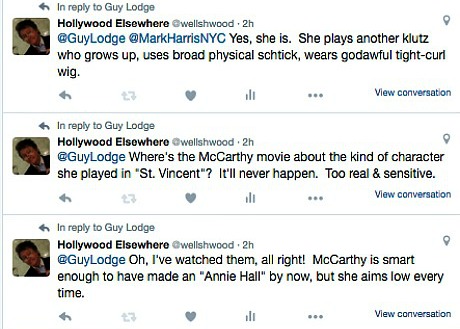Hollywood Elsewhere had to drive back to Los Angeles late last night. 95 minutes from Santa Barbara, and partly in the rain while sipping lemonade-flavored Monster and listening to loud music. I’m sitting in the West H’wood abode as we speak and heading back up…I’m not sure. Possibly tonight. More likely tomorrow morning. I’m shocked to discover it’s 4 pm already.
But before leaving yesterday I sat through the Glenn Close and Melissa McCarthy tributes, which happened at 3 pm and 8 pm respectively.
We all regard Close as a serious, magnetic, world-class actress whose long-awaited Oscar triumph is finally at hand. She’s therefore a known and settled entity, which makes her, unfairly, a somewhat less interesting person than McCarthy, at least from my perspective.
McCarthy began brilliantly as an edgy TV comedienne. She broke into features in 2011 with Bridesmaids (’11) and thereafter became hugely popular with the cheap-seats crowd by mostly playing angry, mouthy, low-rent characters. After playing the coarse card for seven-plus years she shifted into serious drama with her Lee Israel performance in Can You Ever Forgive Me?, and in so doing saved herself from being regarded as a one-trick pony — rich and successful but with a limited repertoire.
Almost three years ago I posted a piece titled “McCarthy’s Game.” The fact that she scored big-time with Can You Ever Forgive Me? means that she and husband-partner Ben Falcone decided sometime early last year or sometime in late ’17 that she had to switch gears.
My basic conclusion was that “with the exception of her concerned-mom character in St. Vincent and to some extent her character in Spy, McCarthy has more or less been playing the same gal.
“I’m talking about an angry, immature, neurotic, sociopathic obsessive who acts out her anger or indifference to social norms more and more until the world pushes back at the end of Act Two (or the beginning of Act Three) and says “whoa, girl…you can’t keep doing this, you have to take a look in the mirror and admit your issues,” etc.
“In response to which a chastened McCarthy takes a look, feels sad, takes a step or two in the right direction and rebounds with a better, stronger game.
Like it or not, but this is more or less what her movies are about.
My basic point was that McCarthy and Falcone seem to lack the character and artistic cojones to up her game in the vein of Woody Allen‘s upward shift when he made Annie Hall (’78). They’ve since proved me wrong, of course.
“McCarthy-Falcone are operating on a much lower level than Allen,” I wrote in April ’16. “They’re out to make big megaplex dough in the real Hollywood realm of 2016, which translates to the fact that audiences no longer want to see Annie Hall-type flicks in theatres (megaplex comedies today pretty much have to be rude, loud, fecal and assaultive). Plus McCarthy-Falcone seem to lack the necessary integrity to even try to make a good, character-driven movie out of the kind of woman she played in St. Vincent.
“McCarthy’s career is all about the comic basement (formulaic reliance, broad strokes, making fun of her pre-Boss girth, crude physical schtick). I’ve sat next to McCarthy fans during all-media screenings and ticket-buyer showings and I know who and what they are. They’re not very worldly or sophisticated, trust me. If McCarthy-Falcone were to make a modest, character-driven film about her St. Vincent single mom looking for love — i.e., struggling to pay the bills, meeting some kindred-spirit guy who gets her, loves her for a few weeks or months and then dumps her or something along those lines — her fans would probably stay away in droves.
“McCarthy fans don’t want grilled salmon with parsley and lemon juice and a modest serving of steamed potatoes on the side. They want hot fast food in tin-foil wrappers and an order of fries. She and Falcone know that, of course, and that’s why they’re doing what they’re doing.”














